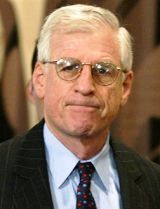Security Council heads to Nairobi for rare meeting to promote peace in Sudan
By EDITH M. LEDERER, Associated Press Writer
UNITED NATIONS, Nov 17, 2004 (AP) — The U.N. Security Council headed to Africa for a rare meeting in the field to promote a quick end to the 21-year civil war in Sudan which the United States says is crucial to ending a separate conflict in Sudan’s western Darfur region.

|
|
U.S. Ambassador to the United Nations John Danforth |
U.S. Ambassador John Danforth, the current council president who promoted the trip, said members expect the meetings on Thursday and Friday in the Kenyan capital, Nairobi, to lead the Sudanese government and southern rebels who have been fighting since 1983 to resolve their remaining differences quickly.
“The Security Council is speaking with one voice,” he said Tuesday. “We are expecting in short order a peace agreement … to be concluded.”
If an agreement is signed to end the civil war, hopefully by the end of the year, that “would put in place the possibility of resolving the various problems of Sudan, including Darfur,” he said.
The 15-member Security Council, the most powerful U.N. body, has sent missions to many countries, and is dispatching one to central Africa immediately after the Nairobi meeting. But the two-day session in Kenya will be only the fourth official council meeting outside New York since 1952.
As a sign of its importance, Secretary-General Kofi Annan, who is traveling elsewhere in Africa, will fly to Nairobi to attend Thursday’s council meeting.
Council ambassadors held closed-door consultations until shortly before they left for the airport Tuesday on a draft resolution which they will adopt in Nairobi. Danforth said it was “99 and 44/100ths percent” completed and the opposing sides were “so close it’s just wordsmithing now.”
The draft expresses the council’s “determination to help the people of Sudan promote national reconciliation, lasting peace and stability, and to build a prosperous and united Sudan in which human rights are respected and the protection of all citizens is assured.”
The council is focusing on the war in southern Sudan that began when rebels from the mainly animist and Christian south took up arms against the predominantly Arab and Muslim north.
As Spain’s U.N. Ambassador Juan Antonio Yanez-Barnuevo explained, an agreement to end the north-south war “would change the overall picture in Sudan” because there would be a new constitution and a new government which could deal more effectively with the Darfur conflict that has claimed over 70,000 lives and forced 1.6 million people to flee their homes.
The draft resolution spells out what the international community will do if an agreement is reached. It envisions the establishment of a U.N. peace support operation and calls for the United Nations, the World Bank and international donors to assist Sudan’s economic reconstruction and development, including possibly by providing debt relief.
“What is clear is if there is peace in Sudan, the international community is going to be there for Sudan,” Danforth said. “On the other hand, if the choice of the parties is not peace, but is continuing fighting, if the disaster of Darfur continues, if civilians continue to be victimized, then of course the international community is going to continue to be interested — but in a very different kind of way.”
The draft resolution emphasizes that a comprehensive north-south peace agreement “will contribute towards sustainable peace and stability throughout Sudan and to the efforts to address the crisis in Darfur.” It “underlines the importance of progress in peace talks” in the Nigerian capital, Abuja, to resolve the Darfur conflict “and insists that all parties … negotiate in good faith to reach agreement speedily.”
The original British draft said the council would consider “further urgent action” against any party in the Darfur conflict that fails to implement an April ceasefire, protect civilians, cooperate with African Union peacekeepers, disarm militias and prosecute the perpetrators of atrocities.
But council diplomats said that just before the bus left for the airport Tuesday, the council agreed to weaken this provision, which now threatens no action but simply states that the council is “deeply concerned by the situation in Sudan and its implications for international peace and security and stability in the region.”
The only outstanding issue in the resolution is whether to refer to previous resolutions about the conflict in Darfur, which raise the possibility of future council action, the diplomats said, speaking on condition of anonymity.
China opposes any mention of the Darfur resolution while Britain is pressing to have the resolutions — and their implicit threats — mentioned, the diplomats said.
The Security Council spends more than half its time on African issues and Spain’s Yanez-Barnuevo said the trip was a “great opportunity for the Security Council to get nearer to the African questions that we are dealing with.”
From Nairobi, France’s U.N. Ambassador Jean-Marc de La Sabliere is leading a council mission to Rwanda, Congo and Burundi from Nov. 21-26 to focus on U.N. efforts to restore peace to central Africa.
China’s deputy U.N. ambassador Zhang Yishang said he expected it to be easier than last year’s council trip to central Africa when members wore helmets and bulletproof vests to visit conflict-wracked eastern Congo where fighting was still taking place.
“This year, I think the situation is much better,” he said. “The whole country is making progress.”
